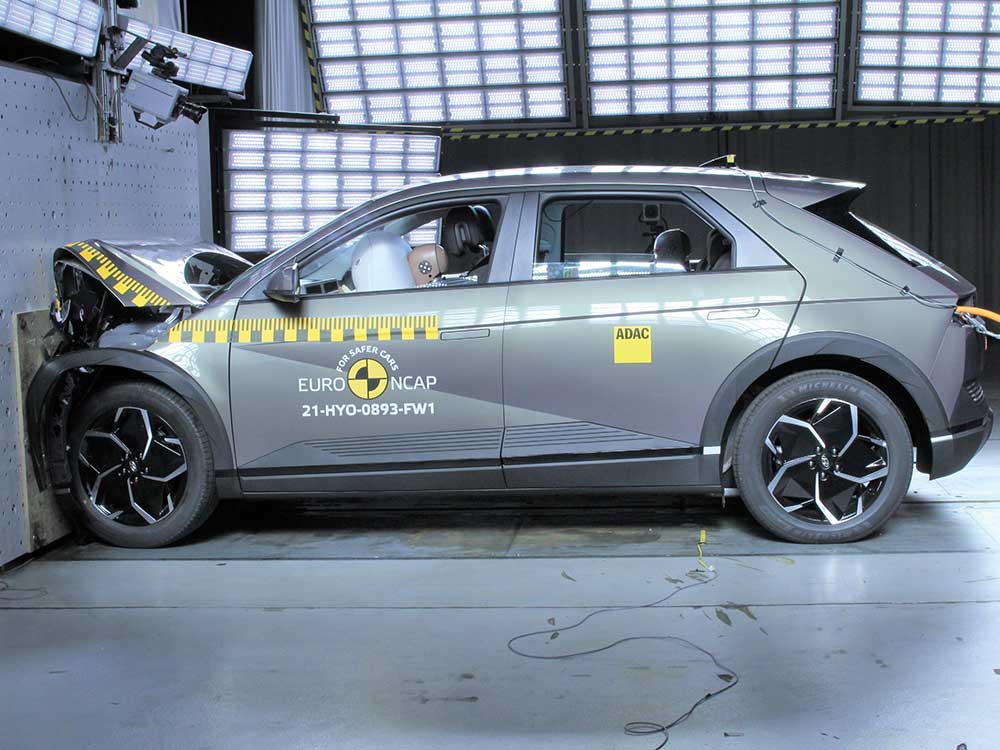Electric vehicles shine in ANCAP safety tests

In a sign of the changing shape of the Australian new vehicle market, three of the four newest five-star crash safety rated cars from Hyundai and Volvo are electric vehicles (EVs).
ANCAP recently released the details of its latest safety test, issuing five-star safety ratings for the Hyundai Ioniq 5 EV and two new alternative-powered variants of the Volvo XC40 – the T5 Recharge PHEV and T8 Recharge EV.
The internal-combustion-powered Hyundai Tucson was the other new model to be awarded a five-star rating.
Launched in September, the Hyundai Ioniq 5 EV provides the full complement of active and passive safety features and technologies to enable it to score the top star rating, according to ANCAP.
The Hyundai EV achieved high scores in the full width frontal test, which features two smaller-statured female crash test dummies; the side impact test, which simulates the effects of a T-bone intersection crash; and the oblique pole test, which evaluates the risk of head injury to the driver should the vehicle run off the road and strike a tree or pole.
The Ioniq 5’s design was also assessed for its ability to not only protect its occupants in a crash, but also the occupants of other vehicles it may collide with.
ANCAP said the Ioniq 5 presented an impressively low risk to other vehicles, with a minimal 0.22 points penalty applied – the best score the safety body has recorded in this area since scoring was introduced in 2020.
"The Ioniq 5’s good measure of safety performance coupled with its green drivetrain provides families and fleet buyers with a good all-round choice," ANCAP Chief Executive Officer Carla Hoorweg said.
"We know safety and environmental performance are top-of-mind considerations for the majority of new car buyers today and it's pleasing to see Hyundai prioritise five-star safety in this new market offering."
Volvo’s newly released XC40 plug-in hybrid electric vehicle (PHEV) and pure electric XC40 carry the same five-star ANCAP safety rating as awarded to the petrol and diesel-powered versions in 2018.
ANCAP said the rating extension followed additional testing undertaken on the XC40 T5 Recharge and T8 Recharge variants to ensure equivalent levels of safety performance.
"To ensure safety is not compromised for consumers wanting to buy an alternative-powered vehicle, for battery and hybrid electric vehicles we conduct additional checks to make sure they don't pose unique risks such as battery rupture or electrical hazards to the occupants or first responders," Ms Hoorweg added.
"This gives consumers peace-of-mind and assists fleet buyers in meeting their safety and environmental targets."
The conventionally powered Hyundai Tucson also achieved a five-star ANCAP safety rating following its release earlier this year.
ANCAP said the Tucson offered similar levels of safety performance to the Ioniq 5, noting that higher-grade variants featured a child presence detection (CPD) system, which provided an audible alert if movement was detected in the second-row seats after the ignition was turned off and the car locked.
CPD systems will begin to be formally assessed by ANCAP and contribute to a vehicle's overall safety rating from 2023.
Click here for full details on the safety performance of the Hyundai IONIQ 5, Hyundai Tucson and Volvo XC40 Recharge.
Charge on with RACQ Roadside Assistance for EVs
Related topics
Things to note
The information in this article has been prepared for general information purposes only and is not intended as legal advice or specific advice to any particular person. Any advice contained in the document is general advice, not intended as legal advice or professional advice and does not take into account any person’s particular circumstances. Before acting on anything based on this advice you should consider its appropriateness to you, having regard to your objectives and needs.
Insurance Products (excluding Travel Insurance) are issued by RACQ Insurance Limited ABN 50 009 704 152 (RACQI) and arranged by its agent, RACQ Distribution Services Pty Ltd (RDS) ABN 35 116 361 650, AFSL 567130 and RDS' authorised representatives (including RACQ Operations Pty Ltd ABN 80 009 663 414, AR No. 234978 (RACQO). Conditions, limits and exclusions apply. RDS and RACQO are in the RACQ group of companies. One of the companies in the RACQ group of companies has a minority shareholding in RACQI.
RDS and RACQO have not taken your personal objectives, circumstances or needs into account when preparing advice regarding insurance products and you will need to consider whether the advice is appropriate for you. Read the Product Disclosure Statement (PDS) and any applicable Supplementary PDS before making a purchase decision on this product. You can also access our Target Market Determinations on this website. RDS receives a commission from RACQI for the policies it arranges. RACQO receives fees paid for services it provides to RDS. Further details about remuneration are available on request prior to purchasing.
Banking and loan products issued by Members Banking Group Limited ABN 83 087 651 054 AFSL/Australian credit licence 241195 trading as RACQ Bank. Terms, conditions, fees, charges and lending policies apply. This is general advice only and may not be right for you. This information does not take your personal objectives, circumstances or needs into account. Read the disclosure documents for your selected product or service, including the Financial Services Guide and the Terms and Conditions, and consider if appropriate for you before deciding.
Except for RACQ Bank, any RACQ entity referred to on this page is not an authorised deposit-taking institution for the purposes of the Banking Act 1959 (Cth). That entity’s obligations do not represent deposits or other liabilities of RACQ Bank. RACQ Bank does not guarantee or otherwise provide assurance in respect of the obligations of that entity, unless noted otherwise.
RACQ Bank subscribes to the Customer Owned Banking Code of Practice which establishes higher standards than the law requires. The Code reflects modern consumer expectations and developments in approaches to issues such as consumer vulnerability, guarantors, and supporting customers through financial hardship. Please read our Customer Owned Banking Code of Practice page for more information.
RACQ Operations Pty Ltd (ABN 80 009 663 414 AR 000234978) and Members Travel Group Pty Ltd (ABN 45 144 538 803 AR 000432492) are acting as an Authorised Representative of the issuer of the insurance, Tokio Marine & Nichido Fire Insurance Co., Ltd. (ABN 80 000 438 291 AFSL 246 548). Any advice set out above is general in nature only, and does not take into account your objectives, financial situation or needs. Before purchasing any travel products, please consider the RACQ Travel Insurance Product Disclosure Statement (PDS) and the Target Market Determinations (TMDs) that apply to these products. Whilst the PDS outlines the Terms and Conditions of these products, the TMDs outline the intended class of customers that comprise the target market for these travel products. This will allow you to consider which products best suit your objectives, financial situation and needs and consider the products appropriateness to your personal circumstances. TMDs also outline matters involving the distribution and the review of these products. The PDS, Supplementary PDS and TMDs for each travel product can be found here.
